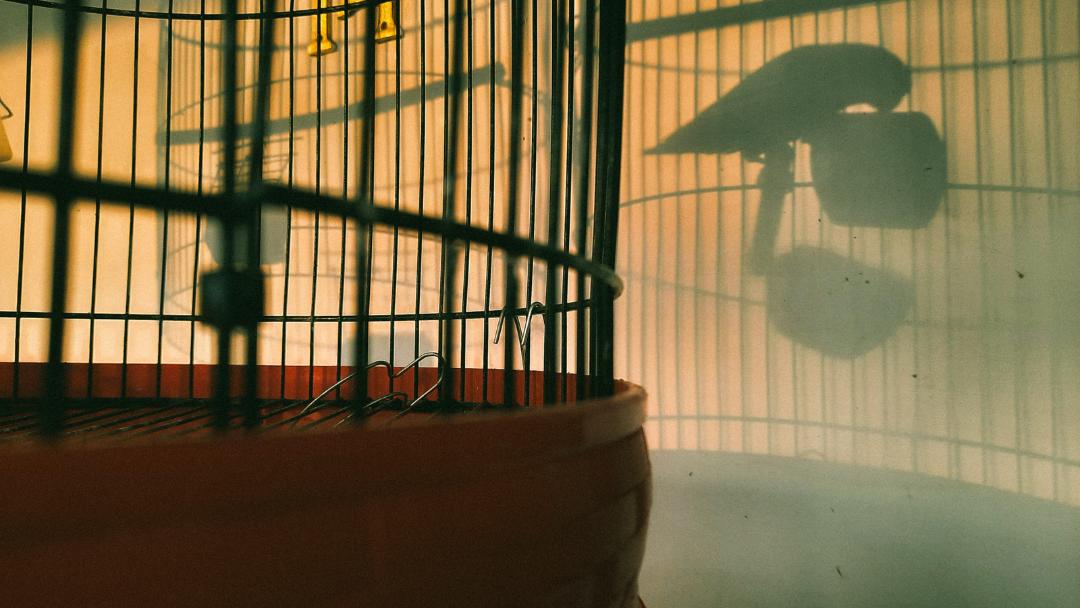He had expected worse. The inevitable letdown after Christmas, the dead parakeet, the New Year’s to come, everything that had happened. But it wasn’t bad. It felt almost good, even, being out of the apartment, walking in the department store still lit up for the holidays, with the special glow of the fish tanks and the UV lights for the lizards who stared like old men.
He realized he should have brought a towel or a small blanket. To cover the box if they in fact did exchange the bird. Though the box itself was conspicuous enough, bright orange, with air holes, the top folding and locking into a handle. If the contents had weighed anything the cardboard edge of the handle would have cut into his hand. But the content was light, the box almost comically large for such a small and lifeless thing.
Christmas tunes still played overhead. He waited by a tank of semi-transparent fish that looked like oversized flecks of mica. They had obviously been injected or fed some horrible chemical that rendered parts of their bodies unnaturally colored—the green of miniature golf Astroturf, Hello Kitty pink, the yellow of a patent leather handbag.
He waited, both hoping someone would come to assist and also wondering if the whole enterprise was too sad and foolish to explain.
No one came, and he eventually wandered to a cash register in the shoe section. The woman behind the counter wore the light blue vest that all the store employees wore, each with a white button nametag the size of a tea saucer pinned to their lapel. Her name was Ethel, which seemed like such an old name for a woman appearing thirty at most, but she was overweight and he wondered if the added pounds had stretched out her wrinkles, or if the crookedness of her wire-framed glassed belied a greater age, the way his grandmother’s unbalanced honey-blonde wig meant a certain self-disregard of the old and dementing.
But he found the crookedness of her glasses, the name button, the blue vest incredibly endearing, and he almost immediately felt an even more incredible love for her, but he knew the love grew out of the weakness he felt, the overwhelming melancholy, and he checked himself, knowing in the end it was a symptom and really something patronizing. All of this ran through his mind in the few seconds he stood before her and read her nametag before speaking. His mind had been like this, lately.
“Can you help me in the pet section?” he asked.
“I don’t work in the pet section,” she said.
“Is there anyone available?”
“I have to get someone.”
He nodded, she got on the phone, whispering into the receiver cupped in her free hand, and then hung up.
“There’s no one until one o’clock,” she explained.
“What if someone needs something now?” he asked.
“It’s technically closed until one.”
“But the rest of the store—”
“I’m sorry.”
“I have until noon,” he explained.
“Noon?” she asked.
“My parakeet died,” he said, holding up the orange box.
She looked at it as if it held a human head.
“It’s in there?” she asked.
“I was told I could exchange it, if it died in twenty-four hours. There’s a return policy. But since you were closed yesterday for Christmas I had forty-eight hours, which ends at noon.”
“Who told you this?”
“The guy who worked there.”
“What was his name?”
“Tom.”
“Tom’s off today.”
“Can I speak to the manager?”
He talked with the manager. She was an older woman with distractedly penciled-on eyebrows who exuded the overly soft empathy mixed with the equally passive and non-authoritative air of an assistant undertaker.
“Tom runs that department,” she explained.
“But he isn’t here today. Who comes in at one?”
“Bill.”
“Can he help me?”
“I’m sure he can.”
“What do I do until one?”
The manager handed him a piece of paper the size of Monopoly money that had obviously been unevenly hand cut from a larger printout. It was a voucher for a cup of coffee at the food counter.
He didn’t particularly want a cup of coffee. And he wondered if one o’clock would be too late. He drifted in the general direction of the food counter, but not before walking through the home furnishing section. He had nearly two hours to kill, and took his time. He walked down the lamp aisle then paused halfway, realizing he had never really thought about just lamps before. Then thought that there must be people whose only job is to think about nothing but lamps. He stopped at one lamp, a small desktop with a straw-colored shade, and tugged at the wooden ball at the end of the pull chain. The lamp was not plugged in, and nothing happened. He pushed the wooden ball and the chain swung back and forth like a pendulum. He then wondered about who chose the wood for the wooden ball, who chose the stain, and if there were fevered debates and hosts of diagrams and equations on impossibly large white boards at lamp think tanks.
It was time to get some coffee, he thought.
He was standing at the food counter, ordering his coffee (after the barista in the blue vest told him the voucher was only valid for a medium-sized) when he heard the voice of a woman saying “I’ll get your grilled cheese if you watch your sister.”
He turned around to see Simone. She saw him as well, and once they made eye contact, neither could pretend they hadn’t seen each other. She was walking from the table where two children sat—one a girl of three or four, the other a boy of eight or nine. The girl looked like the way he had imagined the little girl would have looked like if they had stayed together and had had children, full of energy and bouncing curls and three-year-old-girlishness. The boy was funny looking. And when he stopped staring at the boy and turned to face the approaching Simone she knew the thought in his head just as they had always known each other’s thoughts.
“God, Paul,” she said with a smile. “What are you doing here?”
“I still live here,” he said.
“I knew that, I meant… you know?” she said with a laugh, ever so slightly, the lighter giggle she once had long gone.
“What about you?” he asked.
“Seeing my parents for the holidays,” she said. They studied each other. Realizing they didn’t look all that different.
“What’s in the box?” she asked.
“Nothing right now. I’m getting a bird. A parakeet… they sell them here.”
“So you just have the box?”
“I had it, from another bird. Figured I’d use it to get a new bird… I found out they’re not open yet. The pet section, that is.”
She nodded, knowing he was explaining too much.
“For my son. For Christmas…,” he said. He then added, wondering if the same was true for her, “You see, I’m divorced—”
“I’m sorry,” she said. And she seemed genuinely sorry.
“No, it’s, you know. For the best, I guess. Anyway, I’m celebrating Christmas with him tomorrow.”
“Do you want to join us? I was exchanging something my mom picked out—she still thinks I’m the size of a thirteen-year-old, and the kids got hungry. Those are my two, over there,” she said, gesturing to the table where the girl and boy sat.
He took his medium-sized coffee, and she picked up the grilled cheese, an order of chicken tenders, two apple juices, and a bottle of water, and they sat at the table. She sat next to her daughter, helping the fidgety girl with her chicken tenders while he sat across from the boy, the orange cardboard box with the air holes on the floor at the end of the table.
“This is an old friend of mine,” Simone explained to the kids, “his name is Paul. And Paul, this is Daniel and Alice.”
The girl simultaneously smiled and chewed an entire chicken tender that took up most of her mouth.
The boy stared at Paul as Simone introduced everyone, then spent his time mostly staring at the box, if he wasn’t staring back at Paul. The boy finally took a bite of his grilled cheese, chewing very slowly, as if he were making sure the food wasn’t poisoned.
Paul tried to focus his attention on Simone, but couldn’t avoid taking in the boy, wondering what it was exactly that made him funny looking. The skin so pale and veiny. Maybe it was the nose, which, unlike the typical rounded features of the young, was extremely sharp and angled, almost like a knife. The eyes were small and recessed, so much so you couldn’t judge their color, only knew they were staring at you, and you couldn’t fathom the thoughts within. Or if there were any thoughts at all. But mostly it was the chin. There was almost no chin.
“So where do you live now?” Paul asked Simone as he heard a crunching sound from the boy as he took a bite and then another from his sandwich. Paul realized the boy was eating the crust of the grilled cheese first, in a very systematic way, working the perimeter of the sandwich.
“In Charlotte. My husband got a job at the headquarters for his bank, and I teach—so, I’m pretty flexible.”
“How do you like the South?”
“It’s mostly northerners living there now… and, I like the winters.”
The boy was crunching at the crust, staring at the box. Then back to Paul, back to the box.
“Mommy, I don’t like this one,” the little girl said.
“I’ll eat it then,” Simone said, and took the half-eaten chicken tender and put it in her mouth. As she chewed she smiled at Paul, but it was a sad smile, and he imagined her in Charlotte with the strange boy, the rambunctious girl, working as a teacher, which had always been her goal, but how things hadn’t turned out the way she had planned. He thought of the day to come, when his own son would come over, so happy to see him after he had been away so long, living separately. So excited to see his Christmas gift, which Paul now had to exchange, as he had left the cage uncovered and the parakeet had died in the drafty apartment during the night.
Simone’s son was now kneeling down, peering into one of the air holes of the box.
“Daniel, that’s not polite,” Simone said, embarrassed.
Daniel looked up from the box to Paul, the boy with a vivid shock on his face—he had seen the dead bird. But Paul wasn’t sure if the boy could speak.
“Daniel, come on, eat your sandwich,” Simone said, pulling him by the arm and making him sit back down at the table.
But the boy wouldn’t touch his grilled cheese, only staring at Paul with his deep-set eyes. Paul thought maybe he could stare the boy down, but it was hopeless, the boy had the single-mindedness of a Doberman at the end of a taut chain.
Simone gazed at Paul as if she were hurting but didn’t want to admit it, and Paul studied her as if he wanted to confess about the dead bird, figuring the boy must be able to speak and she would later find out he had lied about the box being empty. That this was the last thing she would remember of him.
But he said nothing, and she said nothing, other than polite goodbyes, kissing each other on the cheek.
Afterwards, he sought the strange comfort of the unlit lamps, then stopped by the toy department and picked up a chemistry set for his son. He didn’t go to meet Bill in the pet section. He took the dead bird home.
Born in Charleston, South Carolina and raised in New Jersey, DAVID J. HUDACEK is a writer in the Boston area. His novel-in-progress Small Town Echoes of Metallic Minds was shortlisted for the 2022 Masters Review Novel Excerpt Prize and longlisted for the 2023 Bath Novel Award. Other recent writings have been published in Vestal Review, Flash Fiction Magazine, and Litbreak Magazine. Much of his previous work has been in playwriting and screenwriting. His plays include I Woke Up in a Sam Shepard Play staged at the Boston Theater Marathon and The Presentation, performed at the United Solo Festival in New York on Theatre Row. Screenplays include Anna Blue (optioned by Cannes award-winning director Jerzy Skolimowski), and The Scouts, a top 50 screenplay at the Academy of Motion Picture’s Nicholl award.
Like what you’re reading?
Get new stories, sports musings, or book reviews sent to your inbox. Drop your email below to start >>>
NEW book release
Ghosts Caught on Film by Barrett Bowlin. Order the book of which Dan Chaon says “is a thrilling first collection that marks a beginning for a major talent.”
GET THE BOOK



